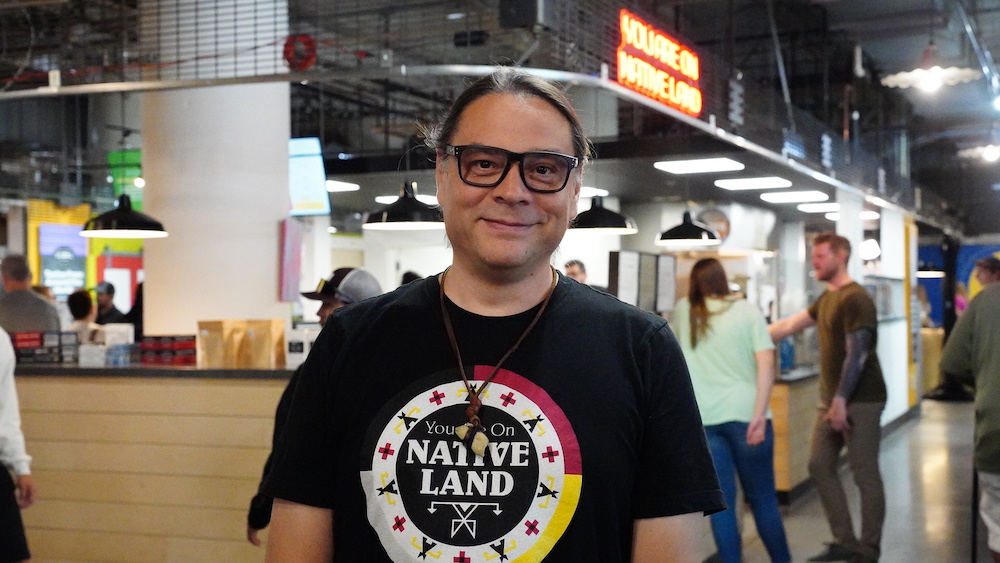
- Details
- By Darren Thompson
MINNEAPOLIS—Award-winning chef Sean Sherman has added a few more job titles — educator, retailer, nonprofit executive — with his newest venture: Indigenous Food Lab (IFL).
Sherman, co-founder of the James Beard awarded Owamni restaurant, opened the first IFL in Minneapolis’s Midtown Global Food Market last week to a curious crowd. It’s a multifaceted facility operated by the nonprofit North American Traditional Indigenous Food Systems (NĀTIFS), which Sherman started to address the economic and health crises affecting Native communities by re-establishing Native foodways.
The IFL is many things: a hot bar featuring Indigenous foods, a research center, a retail market featuring arts, books, games, beauty products, and jewelry products.
It’s also an education and training center that serves as “the heart” of NATIF’s work to reintegrate Native foods and Indigenous-focused education into tribal communities across North America, according to its the nonprofit’s website.
“Our market curates a whole bunch of really cool products like food, jewelry, gifts and games while featuring all Indigenous producers all over the nation,” Sherman told Native News Online.

Another highlight is the education studio, where Sherman and others will teach a curriculum that highlights Indigenous culture. Culinary arts, food preservation, language, or crafting are some of the areas of education, Sherman said.
“We’re recording all of those educational classes and putting them online to create a vault of Indigenous education,” he said.
Sherman’s work has always centered Indigenous food and culture. From Tatanka Truck — Minnesota’s first Native food truck — to the award-winning Owamni, Sherman’s dedication to Indigenous foods has earned him recognition as one of Time Magazine’s 100 Most Influential People in 2023.
Like Owamni’s menu, the Indigenous Food Labs Market’s menu does not include European foods such as dairy, white sugar, or wheat. The menu is structured for guests to order build-your-own-tacos with all Indigenous proteins like bison, smoked whitefish, smoked turkey, three sisters (corn, beans and squash), and wild mushrooms. The kitchen makes its teas, salsas and sauces in-house and features ingredients like herbal teas, chaga, cacao, grains, soups and sunflower seed cookies.
Sherman envisions launching additional Indigenous Food Labs in other regions of the country, including Native communities in Alaska and Hawaii. There have already been talks about opening IFLs in Anchorage, Oahu, Rapid City, Sherman said.
“We want to get Indigenous food products all over the place,” he said. “So, this little market has big plans.”
In the flagship IFL outlet, local Native vendors featured in the market’s retail shop include Ramona Farms, the Ioway Bee Farm, Red Lake Nation, Bidii Baby Foods, Sakari Farms, Dancing Butterfly, Aonehc Aonehc, and Growing Blue Flowers.
One of the goals of the IFL is to build a national supply chain of Indigenous vendors, said Sherman. Creating a growing Indigenous food ecosystem is something Native people have done for generations, Sherman said, adding that strengthening old traditions can help rebuild the health and wellbeing of Indigenous people.
More Stories Like This
USDA Expands Aid for Lost Farming Revenue Due to 2025 PoliciesTwo Feathers Native American Family Services Wins 2026 Irvine Leadership Award
Bill Would Give Federal Marshals Authority to Help Tribes Find Missing Children
Indian Health Service to Phase Out Mercury-Containing Dental Amalgam by 2027
End of Enhanced Obamacare Subsidies Puts Tribal Health Lifeline at Risk
